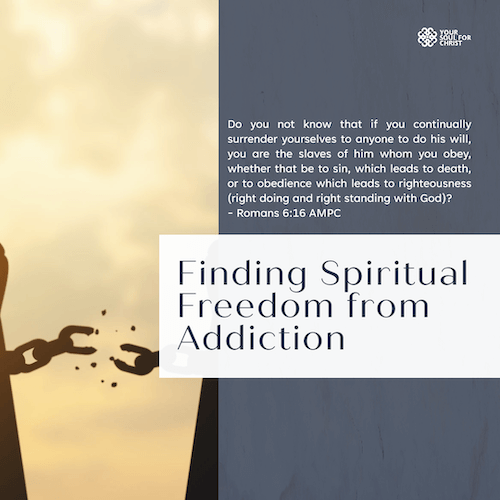Do you not know that if you continually surrender yourselves to anyone to do his will, you are the slaves of him whom you obey, whether that be to sin, which leads to death, or to obedience which leads to righteousness (right doing and right standing with God)?
Romans 6:16 AMPC
In this continuation of our series on addiction, we turn our focus to a transformative approach: finding spiritual freedom from addiction. While the previous post explored the roots and history of addiction, here we delve deeper into how true freedom comes through choosing to surrender to God rather than to the desires that bind us.
This journey toward spiritual freedom from addiction begins with a conscious decision to break away from what enslaves us and to live instead under the guidance and grace of God. For anyone seeking lasting freedom, this spiritual foundation is essential. Romans 6 reminds us that freedom lies in whom we choose to obey. This is either sin, which leads to spiritual death, or God, whose guidance brings true life and righteousness.
The phrase “Do you not know…” calls us to pay attention. This question implies we are expected to recognise the importance of whom we surrender to and the impact that choice has on our freedom. In Romans 6, Paul speaks to those freed from sin’s grip by God’s grace, experiencing spiritual freedom from sinful behaviours. This freedom is available to anyone who chooses to live under God’s guidance.
For anyone struggling with addiction, the first step to true freedom is deliverance from the power of sin. Without this foundational change, overcoming addiction remains an uphill battle. We must first be freed from the grip of sin to truly experience deliverance from addictive behaviours.
Addiction doesn’t develop overnight. It forms when we continually surrender to a specific action or habit. This surrender isn’t occasional or forced—it’s a regular, willing choice. James 1:13–15 explains how temptation arises from our own desires, which entice and lead us astray. When we yield to these desires, they give birth to sin, which ultimately leads to death.
The desires that tempt us find its root within us; they aren’t external forces acting on us. Addiction is not simply about the action itself but about whom we are ultimately surrendering to. We either surrender to God’s will or to sin, represented by the devil. Addiction, in a negative sense, is a dangerous surrender to sin. Yet, when we choose God, our surrender becomes a beautiful act of devotion.
When we surrender, it’s to do the will of the one we yield to—either God or sin. We cannot serve one and still control the other. God has given each of us the freedom to choose our master, but this choice is more than words; we demonstrate this choice through our consistent actions and obedience.
As Paul explains, “you are slaves of the one whom you obey.” Our daily decisions and habitual actions reveal our master. When we surrender to God’s will, we let Him lead every aspect of our lives. As Joshua encouraged in Joshua 24:15, we must “choose this day whom you will serve.” This is a daily choice, one that shapes the direction of our lives.
In conclusion, addiction, at its core, is about surrender and choice. We have the liberty to choose our path—to follow God or to be bound by the chains of sin. True freedom comes when we surrender to God, aligning our will with His. Each day, we have the opportunity to decide whom we will serve. Choose God, and let every act of surrender lead you closer to righteousness and true freedom in Him.
